
IMF SEMINAR EVENT
DATE: October 12, 2017
DAY: Thursday
8:30 AM - 12:15 PM
LOCATION: IMF HQ1 – Meetings Halls A&B
Overview
The 2030 development
agenda aims to achieve sustainable and inclusive growth. The road ahead is
paved with challenges driven by long-term trends—such as demographics and
automation—that are already shaping the future of several developing countries.
Against this background, the conference will focus on the following questions:
With developing economies increasingly interlinked to the global economy, how
will these trends shape the economic landscape over the next two decades? What
job opportunities and challenges to inclusive growth and gender equality can
these long-term trends create for developing countries? What role can economic
diversification and structural transformation play in this context? How can
domestic policies—especially education, innovation and infrastructure
policies—facilitate these opportunities and mitigate the challenges and
barriers to inclusive growth?
Join the conversation via #IMF2030
Join the conversation via #IMF2030
Towards 2030 Trends, Opportunities, Challenges and Policies for Inclusive Growth
Towards 2030 Trends, Opportunities, Challenges and Policies for Inclusive Growth
Panelists
Panelist: Mauricio Cardenas
 Mauricio Cardenas is the Minister of Finance and Public Credit of
the Republic of Colombia. He has been Minister of Mines and Energy, Minister of
Economic Development, Minister of Transport and Director of the National
Planning Department. Previously, he served as President of the Latin American
and Caribbean Economic Association and as the Executive Director of
Fedesarrollo, a Colombian think-tank. He holds a Ph.D. in economics from the
University of California at Berkeley.
Mauricio Cardenas is the Minister of Finance and Public Credit of
the Republic of Colombia. He has been Minister of Mines and Energy, Minister of
Economic Development, Minister of Transport and Director of the National
Planning Department. Previously, he served as President of the Latin American
and Caribbean Economic Association and as the Executive Director of
Fedesarrollo, a Colombian think-tank. He holds a Ph.D. in economics from the
University of California at Berkeley.
Panelist: Ricardo Hausmann
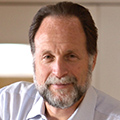 Ricardo Hausmann is Director of Harvard's Center for International Development and
Professor of the Practice of Economic Development at the Kennedy School of
Government. He also teaches a capstone course on the MPAID program. Previously,
he served as the first Chief Economist of the Inter-American
Development Bank. He has served as Minister of Planning of Venezuela and as
a member of the Board of the Central Bank of
Venezuela. He also served as Chair of the IMF-World
Bank Development Committee. He holds a PhD in economics from Cornell
University.
Ricardo Hausmann is Director of Harvard's Center for International Development and
Professor of the Practice of Economic Development at the Kennedy School of
Government. He also teaches a capstone course on the MPAID program. Previously,
he served as the first Chief Economist of the Inter-American
Development Bank. He has served as Minister of Planning of Venezuela and as
a member of the Board of the Central Bank of
Venezuela. He also served as Chair of the IMF-World
Bank Development Committee. He holds a PhD in economics from Cornell
University.
Panelist: Denny Kalyalya
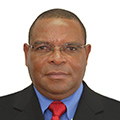 Denny
H. Kalyalya is the Governor
of Bank of Zambia since March 2015. He previously served as Executive Director
and Alternate Executive Director at the World Bank. He previously served as
Deputy Governor for Operations at the Bank of Zambia. Prior to that, he served as
Economics Lecturer, Assistant Dean, and Head of the Economics Department, at
the University of Zambia. He spent a year at the IMF, African Department, as a
special appointee. He holds a Ph.D. in Economics from University of
Massachusetts/Amherst.
Denny
H. Kalyalya is the Governor
of Bank of Zambia since March 2015. He previously served as Executive Director
and Alternate Executive Director at the World Bank. He previously served as
Deputy Governor for Operations at the Bank of Zambia. Prior to that, he served as
Economics Lecturer, Assistant Dean, and Head of the Economics Department, at
the University of Zambia. He spent a year at the IMF, African Department, as a
special appointee. He holds a Ph.D. in Economics from University of
Massachusetts/Amherst.
Panelist: James Manyika
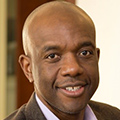 James Manyika is the Chairman of the McKinsey Global
Institute (MGI). Based in Silicon Valley for over 20 years, he has worked with
the chief executives of many of the world’s leading technology companies on a
variety of issues, including strategy and business transformation and the
launch of several market-shaping products and services. Manyika also works with
chief executives in other sectors on opportunities from technology and other global
trends.
James Manyika is the Chairman of the McKinsey Global
Institute (MGI). Based in Silicon Valley for over 20 years, he has worked with
the chief executives of many of the world’s leading technology companies on a
variety of issues, including strategy and business transformation and the
launch of several market-shaping products and services. Manyika also works with
chief executives in other sectors on opportunities from technology and other global
trends.
Panelist: Sahar Nasr
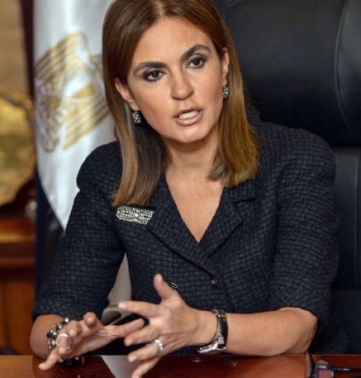 Sahar Nasr is the Egyptian Minister of Investment and
International Cooperation. She is a Professor of Economics at the American
University in Cairo. She is the National Coordinator of the National Committee
for the Follow-Up on the Implementation of the Sustainable Development Goals.
Dr. Nasr also serves as Governor of Egypt to several institutions such as The
World Bank, The European Bank for Reconstruction and Development, Arab Bank for
Economic Development in Africa, and Asian Infrastructure Investment Bank.
Sahar Nasr is the Egyptian Minister of Investment and
International Cooperation. She is a Professor of Economics at the American
University in Cairo. She is the National Coordinator of the National Committee
for the Follow-Up on the Implementation of the Sustainable Development Goals.
Dr. Nasr also serves as Governor of Egypt to several institutions such as The
World Bank, The European Bank for Reconstruction and Development, Arab Bank for
Economic Development in Africa, and Asian Infrastructure Investment Bank.
Panelist: Mthuli Ncube
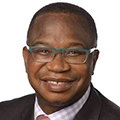 Mthuli
Ncube is Professor of Public Policy at Blavatnik School of Government,
University of Oxford, where he teaches and researches in the areas on
macroeconomics, finance, development economics, political economy, and health
economics. He joined from the African Development Bank Group, where he was as
Chief Economist and Vice President, and championed the “inclusive growth”
agenda for Africa. Professor Ncube holds
a PhD in Economics from University of Cambridge.
Mthuli
Ncube is Professor of Public Policy at Blavatnik School of Government,
University of Oxford, where he teaches and researches in the areas on
macroeconomics, finance, development economics, political economy, and health
economics. He joined from the African Development Bank Group, where he was as
Chief Economist and Vice President, and championed the “inclusive growth”
agenda for Africa. Professor Ncube holds
a PhD in Economics from University of Cambridge.
Panelist: Dani Rodrik
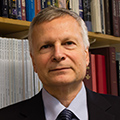 Dani
Rodrik is the Ford Foundation Professor of International Political Economy at
Harvard's John F. Kennedy School of Government. Professor Rodrik is an
economist whose research covers globalization, economic growth and development,
and political economy. He is affiliated with the National Bureau of
Economic Research, Centre for Economic Policy Research (London), and the Center
for Global Development among other research organizations. He is currently
President-Elect of the International Economic Association. Professor Rodrik holds a Ph.D. in economics from
Princeton University.
Dani
Rodrik is the Ford Foundation Professor of International Political Economy at
Harvard's John F. Kennedy School of Government. Professor Rodrik is an
economist whose research covers globalization, economic growth and development,
and political economy. He is affiliated with the National Bureau of
Economic Research, Centre for Economic Policy Research (London), and the Center
for Global Development among other research organizations. He is currently
President-Elect of the International Economic Association. Professor Rodrik holds a Ph.D. in economics from
Princeton University.
Panelist: Carolina Sanchez
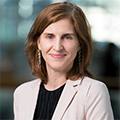 Carolina
Sanchez is the
Senior Director of the Poverty and Equity Global Practice at the World Bank.
Prior to this assignment, she was the Poverty and Equity Practice Manager in
the Europe and Central Asia region. Carolina has worked on operations, policy
advice and analytical activities in Eastern Europe, Latin America and South
Asia, and was part of the core team working on the WDR2012, “Gender Equality
and Development”. Carolina has a PhD in Economics from Harvard University.
Carolina
Sanchez is the
Senior Director of the Poverty and Equity Global Practice at the World Bank.
Prior to this assignment, she was the Poverty and Equity Practice Manager in
the Europe and Central Asia region. Carolina has worked on operations, policy
advice and analytical activities in Eastern Europe, Latin America and South
Asia, and was part of the core team working on the WDR2012, “Gender Equality
and Development”. Carolina has a PhD in Economics from Harvard University.
Panelist: Abebe Selassie
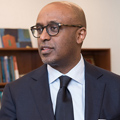 Abebe Aemro Selassie is the Director of
the IMF’s African Department, with responsibility for the Fund’s operations and
engagement with the 45 member countries from sub-Saharan Africa. He assumed
this role in September 2016. Prior
to this assignment, he oversaw the IMF’s work on Portugal under its
IMF/EU/ECB-supported adjustment program. Previously, he was the mission chief
for South Africa. Earlier in his career, he worked on the Fund’s lending
programs with Turkey, Thailand, Romania, and Estonia. Before
joining the IMF, he worked for the Government of Ethiopia and the
Economist Intelligence Unit in London.
Abebe Aemro Selassie is the Director of
the IMF’s African Department, with responsibility for the Fund’s operations and
engagement with the 45 member countries from sub-Saharan Africa. He assumed
this role in September 2016. Prior
to this assignment, he oversaw the IMF’s work on Portugal under its
IMF/EU/ECB-supported adjustment program. Previously, he was the mission chief
for South Africa. Earlier in his career, he worked on the Fund’s lending
programs with Turkey, Thailand, Romania, and Estonia. Before
joining the IMF, he worked for the Government of Ethiopia and the
Economist Intelligence Unit in London.
Panelist: Gayle Smith
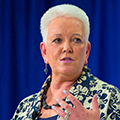 Gayle
E. Smith
is the President and CEO of the ONE Campaign. She served
as a top advisor on development issues for two American presidents. In her most
recent role, Administrator of the U.S. Agency for International Development,
Smith led a staff of more than 10,000 people working to end extreme poverty,
and promote resilient, democratic societies. Smith had previously served as
special assistant to President Obama and senior director for development and
democracy at the National Security Council, and as special assistant to
President Clinton and senior director for African affairs at the National
Security Council. Smith earned a B.A. from the University of Colorado.
Gayle
E. Smith
is the President and CEO of the ONE Campaign. She served
as a top advisor on development issues for two American presidents. In her most
recent role, Administrator of the U.S. Agency for International Development,
Smith led a staff of more than 10,000 people working to end extreme poverty,
and promote resilient, democratic societies. Smith had previously served as
special assistant to President Obama and senior director for development and
democracy at the National Security Council, and as special assistant to
President Clinton and senior director for African affairs at the National
Security Council. Smith earned a B.A. from the University of Colorado.
Panelist: Vera Songwe
 Vera Songwe of Cameroon is the Executive Secretary of the
United Nations Economic Commission for Africa since April 2017. Prior to her
appointment, she was the International Finance Corporation’s Regional Director
covering West and Central Africa. Previously, she was the World Bank’s Country
Director for Senegal, Cape Verde, Gambia, Guinea-Bissau and Mauritania. Before
that, Ms. Songwe held the post of Adviser to the Managing Director of the World
Bank for the Africa, Europe and Central Asia and South Asia Regions. Ms. Songwe
holds a PhD in Mathematical Economics from the Université Catholique de
Louvain, in Belgium.
Vera Songwe of Cameroon is the Executive Secretary of the
United Nations Economic Commission for Africa since April 2017. Prior to her
appointment, she was the International Finance Corporation’s Regional Director
covering West and Central Africa. Previously, she was the World Bank’s Country
Director for Senegal, Cape Verde, Gambia, Guinea-Bissau and Mauritania. Before
that, Ms. Songwe held the post of Adviser to the Managing Director of the World
Bank for the Africa, Europe and Central Asia and South Asia Regions. Ms. Songwe
holds a PhD in Mathematical Economics from the Université Catholique de
Louvain, in Belgium.
Panelist: Melanne Verveer
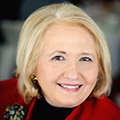 Melanne
Verveer is the
executive director of the Institute for Women, Peace and Security at Georgetown
University. Ambassador Verveer most recently served as the first U.S.
Ambassador for Global Women’s Issues, a position to which she was nominated by
President Obama in 2009. President Obama also appointed her to serve as the
U.S. Representative to the UN Commission on the Status of Women. She also
serves as the Special Representative on Gender Issues for the OSCE
Chairmanship. She is a member of the Council on Foreign Relations, the
Trilateral Commission and serves on the Boards of the National Endowment for
Democracy, the Atlantic Council, and the World Bank Advisory Council on Gender
and Development. Ambassador Verveer has a B.S. and M.S. from Georgetown
University.
Melanne
Verveer is the
executive director of the Institute for Women, Peace and Security at Georgetown
University. Ambassador Verveer most recently served as the first U.S.
Ambassador for Global Women’s Issues, a position to which she was nominated by
President Obama in 2009. President Obama also appointed her to serve as the
U.S. Representative to the UN Commission on the Status of Women. She also
serves as the Special Representative on Gender Issues for the OSCE
Chairmanship. She is a member of the Council on Foreign Relations, the
Trilateral Commission and serves on the Boards of the National Endowment for
Democracy, the Atlantic Council, and the World Bank Advisory Council on Gender
and Development. Ambassador Verveer has a B.S. and M.S. from Georgetown
University.






